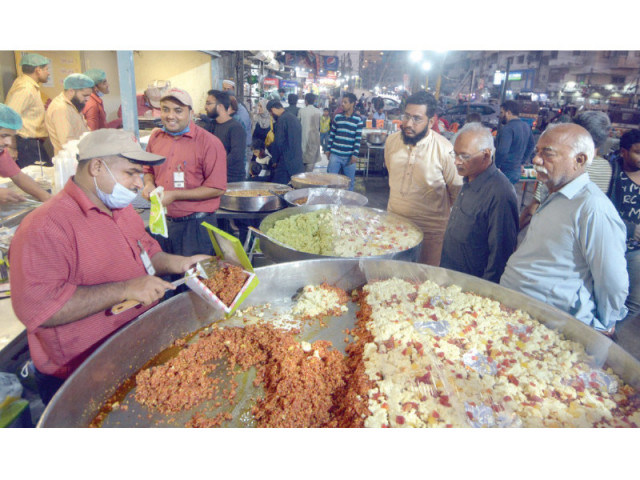Winter delicacies escape affordability
Peaking prices of rich, traditional dishes have forced people to embrace frugality this chilly season

Following the arrival of the winter season, food streets across cities in Pakistan start filling up with shivery customers, who are lured in by the tantalizing aromas of buttery treats, oily appetizers, hot beverages and warm broths; however, as uncontrolled artificial inflation in the port city compels citizens to adopt a more austere lifestyle, many gourmands on a tight budget have to forego the soul warming embrace of their favorite comfort foods.
Jamila, is one such local from the PIB Colony, who had to bid farewell to her beloved winter treats this season due to their skyrocketing prices. “Carrot halva, bone broth, fried fish, boiled eggs, coffee, Kashmiri pink tea, nuts and dried fruits all have become unaffordable for the middle classes. These delights are now reserved for the affluent only,” lamented Jamila, who felt that inflated food prices and limited budgets had made it difficult to indulge in the seasonal delicacies.
Concurring with Jamila on the rising costs of store-bought winter delights, Saba, another local, revealed that she had resorted to preparing some of the staple winter dishes at home. “For middle class families like ours, consuming homemade chicken bone broth is our only mode of indulgence this winter,” said Saba, who further added that the chicken bone broth, which was available for Rs50 per cup last year, was now selling at Rs80.
On a similar note, Kamran, a resident of Gulshan-e-Iqbal also noted a similar rise in the prices of traditional sweets like halva. “Despite being a favorite across all ages, gourmet varieties of halva, like that made out of carrots, has become out of reach for financially strained families. Enjoying these treats now requires a budget of at least Rs3000 per family,” bemoaned Kamran, who claimed that a family sized serving of halva cost Rs2000 last year.
Backing customer’s claims, Rizwan Saleem, the owner of a shop selling popular winter delicacies like sweets, tea and soup, said “prices of carrot halva, tea, coffee, hot flavored milk, bone broth, and Chinese soups have increased by 30 to 35 per cent.” Saleem said who experienced a 15 to 20 per cent drop in sales this year.
According to Dr Aftab Hussain, a general physician, regularly consuming soup, bone broth, and other hot drinks is highly recommended during winters. “The incidence of respiratory illnesses increases in this season, therefore drinking hot drinks is very important since they help alleviate allergies and nasal congestion. Moreover, chicken, lamb, and beef bone broth alongside seafood contain high amounts of protein, which helps build immunity and ward off diseases,” highlighted Dr Hussain.
While some food connoisseurs might desire winter dishes for their purported health benefits others simply turn to fat filled nuts and dried fruits for their high energy content, which helps in keeping them warm during the cold weather. However, like other winter specials, these food items too have become highly unaffordable for the average household.
“Eating a variety of nuts and dried fruits has become a dream for the masses. The only nuts most people are buying these days are peanuts, which cost anywhere between Rs50 to Rs100 per serving,” confirmed Muhammad Usman, a nuts seller.
Speaking to The Express Tribune on the matter, government official said, “Appropriate measures are being taken to enforce the approved government rates for essential food items.”
Published in The Express Tribune, March 5th, 2024.



















COMMENTS
Comments are moderated and generally will be posted if they are on-topic and not abusive.
For more information, please see our Comments FAQ